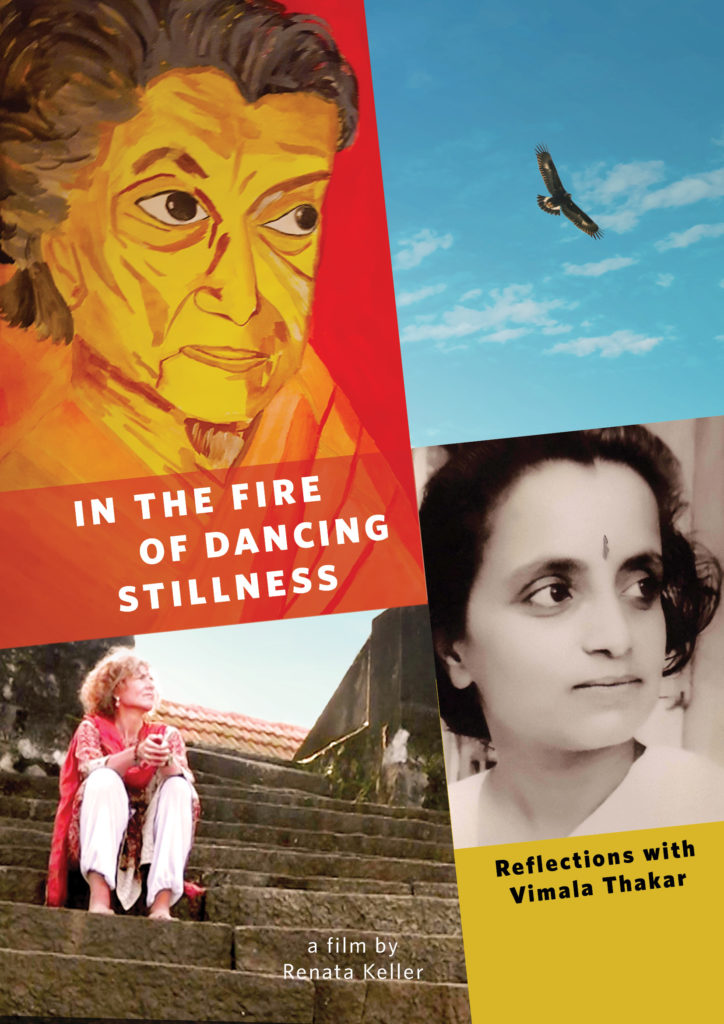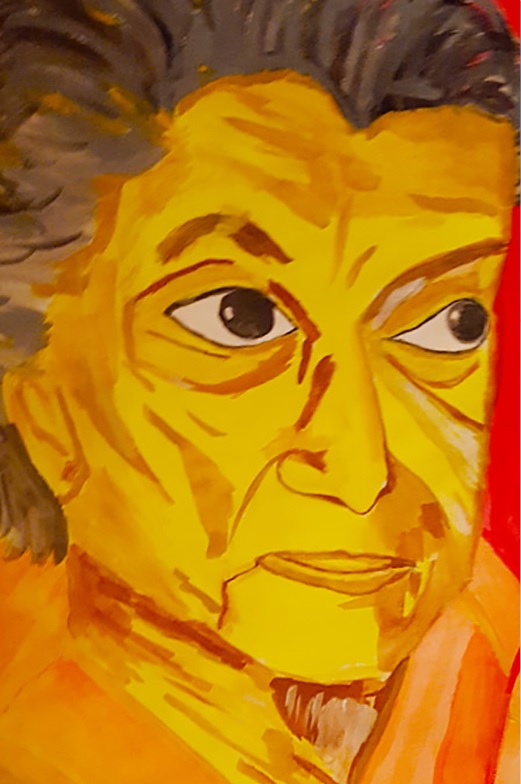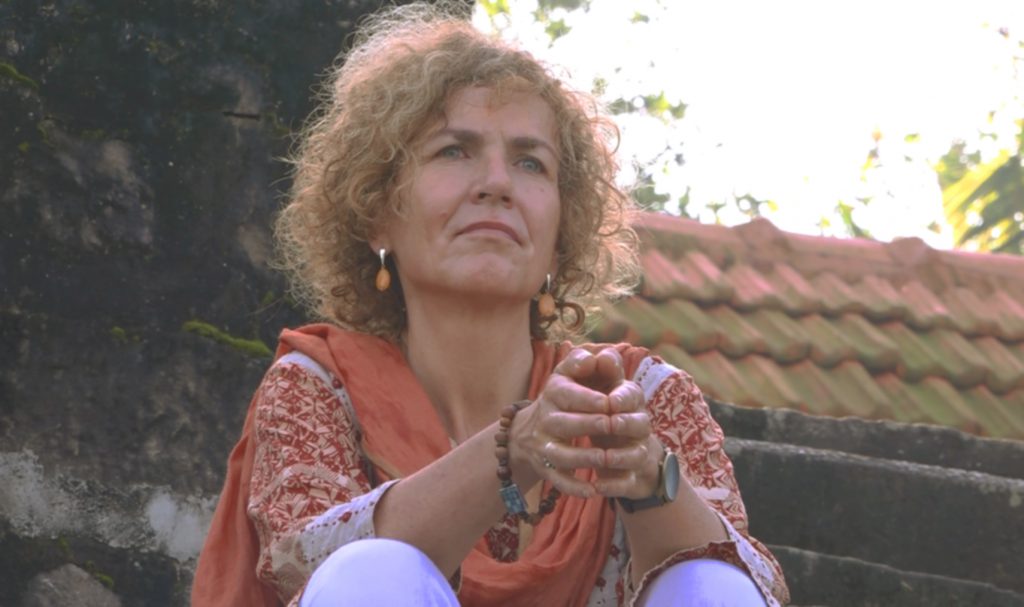For now, the film In the Fire of Dancing Stillness – Reflections with Vimala Thakar will be presented regularly as part of privtate online screenings.
From October 27, 2020, the film will also be available as VoD here.
For press and interview requests please contact: inthefireofdancingstillness(at)posteo(dot).de or use the contact form.
This film is an ode to the power of silence, a song of devotion, a dance with dignity. A fiery contemplation on our responsibilities. It is a love poem inspired by a noble Indian woman and her rebellious spiritual life.
Logline
Is it possible to live a more peaceful and creative life on our planet? In a time when the state of the planet poses important questions: What is life worth to us? And what do we still consider sacred?
These questions inspired the Director to meet the Indian mystic, philosopher and grassroots activist Vimala Thakar (1921 – 2009). It was an encounter that deeply inspired and changed her life. Almost twenty years later, she researches the profound work of this fascinating woman again in the context of our time, and translates her urgent call for holistic thinking and action into a cinematic work of art.
Synopsis
The film In the fire of dancing stillness – Reflections with Vimala Thakar shows the impressive life of an independent Indian woman who sensed the new potential of human coexistence by turning inwards to explore the inner life.
We meet a female spiritual seeker who went against the social Indian norms in the middle of the 20th century. Even though women were not allowed to read religious texts, she studied the Indian Vedas and Upanishads, and learned Sanskrit. She struggled passionately to find her own linguistic expression that would convey and communicate her heart‘s desire for inner and outer peace. The film director takes us on an explorative journey where we first meet Vimala Thakar as a young woman.
Unimpressed by several marriage proposals, she joined Vinoba Bhave‘s peaceful land reform movement in India and along with hundreds of fellow campaigners she walked all across India by foot, convincing rich landowners to give a part of their land to poor farmers, so they could build up their own independent existence. The Vinoba movement was, and still is, one of the few non-vio- lent revolutions worldwide in which people gave away land for purely humane and heartfelt reasons, without being forced to do so by a powerful authority.
Vimala Thakar had to end her commitment with the movement due to a car accident. Her subsequent meeting with the philosopher and author Jiddu Krishanmurti changed her life radically, and she finally realized what had become clear for her over the years: That only the inner work and a transformation of one’s own consciousness will counteract the violence and aggression in oneself and in the world. She decided to dedicate her life to following the inner path and was soon invited to Europe, South America and India, where she began to give lectures and seminars on inner transformation.
In the film we meet a wise woman who fought unceasingly for social justice and for the education of young people in India. Inspired by Mahatma Gandhi and his call for non-violent and creative resistance, she became an independent explorer and practitioner of life and charity. It was especially important to her not to be seen as an authority, but to meet people as an equal and friend.
The film illuminates her collaborative and creative ways of working and responding, a more female and intuitive way of leadership. For over 30 years she travelled throughout India and the world, met thousands of people, and led hundreds of social worker camps in India. During Vimala‘s lifetime,
92 books were published about her work in English, 29 books in Marathi, 123 books in Gujarati and 47 books in Hindi and translated into other European languages. This illustrates the spread of her influence in Asia, Europe and America. Nevertheless, she was very shy, and not liking fame or media presence, she remained relatively unknown despite the volume of her work and activities.
As we are faced with the great challenges of the 21st century, Vimala asks us that our lives should be the expression of a new dynamic of human relationships, a new culture based on inner stillness. In view of a growing sense of meaninglessness in the globalized and technologized world that we have created, she encourages us to find strength in silence and contemplation. And now that civilization is facing serious challenges, we are called to create and shape new forms of co-existence between people and nature.
The film is an invitation to go deep within and to take a fresh look at ourselves and the world around us, with a rejuvenated curiosity for life. In this contemplative space, the dominant stance of knowledge and thinking is questioned, and a non-verbal exploration of existence comes to the fore.
Biography and filmography of the director
Renata Keller is a filmmaker and dialogue facilitator based in Berlin and Switzerland. She worked in visual arts for over thirty years and until 2018 has been the CEO and art director of the German philosophical quarterly magazine ‘evolve’. After finishing her master’s degree in Applied Imagination at the University of Arts (London) in 2006, Renata went on to study documentary filmmaking in London. Renata’s lifelong pursuit of philosophical and spiritual questions, along with her interest in women’s development, led her to Gerda Lerner’s work and inspired the creation of the film Why Women Need to Climb Mountains (2016) . In the film Echte Heilung findet in Freiheit statt (2018) the director portraits the biochemist Dr. Roger Kalbermatten and his research on the healing power of nature. The idea for her latest film In the Fire of Dancing Stillness – Reflections with Vimala Thakar was born after her meeting with Vimala Thakar in 2001 and Renata’s continuous questioning about the values of our times. In Berlin she leads various Salons and gives dialogue seminars worldwide.
Credits
Director and Producer Renata Keller
Sound & Music Composition Fabian Koppri
Music Composition Jyothi Anand
Camera Renata Keller, Monilal Padavor, Arun Alakode
Editor Renata Keller
Editing Consultant Raquel Martins
Colour Grading Sergi Sanchez
Length: 110min
Language: English (German language available)
Subitles: English (German subtitles available)
Film poster

Photos
Production
Vertical Impulse
Motzstraße 53
10777 Berlin

